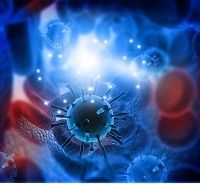Broadly Neutralizing Antibody Suppresses HIV Infection
Researchers at Rockefeller University in New York City suggest that a member of a new generation of broadly neutralizing antibodies to HIV appears to reduce the viral load of patients with the infection and significantly reduce viremia through 28 days.

Researchers at Rockefeller University in New York City suggest that a member of a new generation of broadly neutralizing antibodies to HIV appears to reduce the viral load of patients with the infection and significantly reduce viremia through 28 days. The findings are the result of a first-in-man dose escalation phase I clinical trial of 3BNC117, published online in Nature.
Pre-clinical and clinical trials of HIV immunotherapy with a combination of first-generation monoclonal antibodies were previously found to be largely ineffective and therefore abandoned. But recently developed, single-cell-based antibody cloning methods have uncovered the new generation of far more potent broadly neutralizing antibodies. “What's special about these antibodies is that they have activity against over 80 percent of HIV strains and they are extremely potent,” said co-first author Marina Caskey, MD, assistant professor of clinical investigation, Laboratory of Cellular Physiology and Immunology, Rockefeller University. Specifically, 3BN117 showed activity against 195 out of 237 HIV strains by targeting the CD4 binding site of the HIV envelope.
Although about 10% to 30% of people with HIV naturally produce broadly neutralizing antibodies, this occurs only after several years of infection. Unfortunately, by then, the virus usually has evolved to escape even these potent antibodies.
However, researchers can isolate and then clone broadly neutralizing antibodies to make them therapeutic agents against HIV infections before they have more time to evolve. Prior investigations in the Laboratory of Cellular Physiology and Immunology at Rockefeller University showed that the potent antibodies could prevent or suppress infection in mouse and non-human primate models of HIV.
To assess these antibodies in humans, Caskey and colleagues administered a single dose of 3BN117 to uninfected and HIV-infected patients and monitored them for 56 days. All patients with HIV showed up to 300-fold decreases in the amount of measureable virus in their blood at the highest dosage level of the antibody tested in the study. Drops in viral load were dependent on each patient’s starting viral load and the sensitivity of their specific HIV strains to 3BN117.
The antibody was also well tolerated and remained active for an extended period of time. One-half of participants who received the highest dose displayed viral loads below their starting levels at the end of the 8-week study without resistance to 3BNC117.
The study investigators feel that broadly neutralizing antibodies could potentially enhance patients’ immune responses against HIV, leading to better infection control. Antibodies like 3BNC117 could also potentially kill viruses hidden in infected cells that serve as viral reservoirs that are inaccessible to current antiretroviral drugs.
Just as with other antiretrovirals, 3BNC117 will likely require combination use with other antibodies or antiretrovirals. “One antibody alone, like one drug alone, will not be sufficient to suppress viral load for a long time because resistance will arise,” said Caskey. However, 3BNC117 may only require treatment once every few months, whereas antiretroviral agents require daily treatment.
“In contrast to conventional antiretroviral therapy, antibody-mediated therapy can also engage the patient's immune cells, which can help to better neutralize the virus,”said co-first author Florian Klein, assistant professor of clinical investigation, Laboratory of Cellular Physiology and Immunology, Rockefeller University.